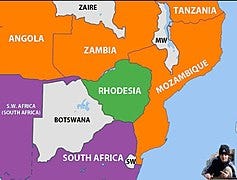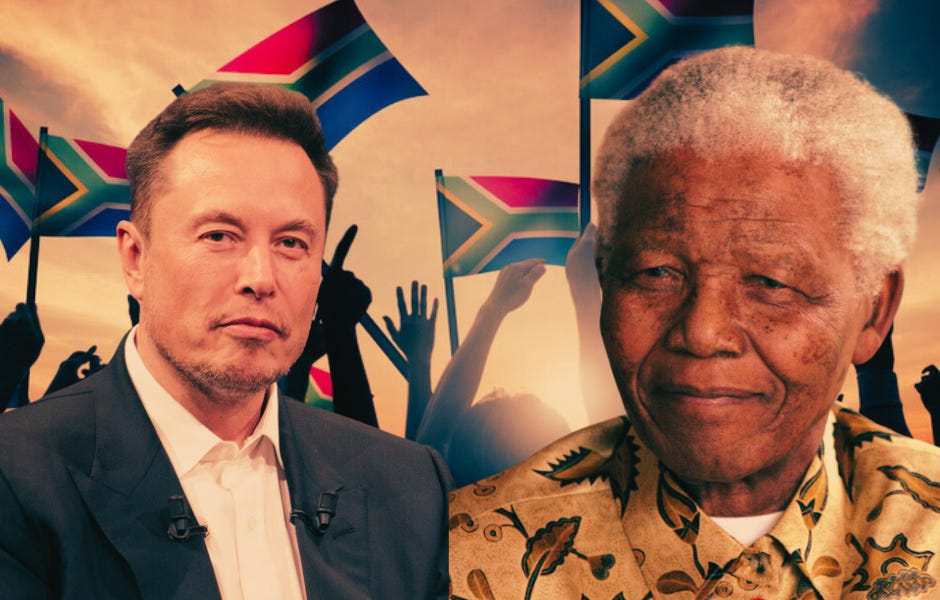The Problem Elon Called Out is an Old One, and the US is Culpable
“Kill the Boer” and Elon’s Brave Stand
A Note to Our Readers: Thanks to Elon Musk’s comments on the issue, the topic of white genocide in South Africa has risen to the fore of the culture war. Because of the importance of that issue, one the MSM refuses to cover honestly, we’re interrupting the next article in the Epstein series to release this special report on US culpability in southern Africa’s white genocide problem.
Thanks largely to the positive press regarding the 2010 World Cup and propaganda surrounding former South African leader Nelson Mandela, many in the West view South Africa as the “Rainbow Nation.” According to that unfounded but general impression, post-apartheid South Africa is where racism died, and now the nation’s various tribes and ethnic groups – Zulus, Boers, Indians, and Anglos – get along and are together building a bright and diverse future. That’s a lie. The truth is that South Africa is anything but a beautiful nation of successful and peaceful diversity. Rather, it’s a nation at war with itself, as recent videos of the EFF chanting “kill the Boer,”
Elon’s comments about the video,
and attempts to defend it
show.
The truth is that South Africa is a land where affirmative action on steroids has impoverished the country. It has turned the white lower class into denizens of slums more horrific than any that existed under apartheid
while the nation’s remaining white farmers are murdered with impunity by thugs. What was once the continent’s dominant economy is now a center of injustice, genocide, and human suffering.
This article will discuss the culpability of American foreign policy as to what is now happening in South Africa and how that same foreign policy began the process of white genocide in Rhodesia.
Andy Young, Rhodesia, and the Beginnings of the Genocide
Rhodesia was a little land that sat north of South Africa and west of Mozambique. Explored by the famous hunter and adventurer Courtney Selous
and founded by the Cecil Rhodes-led British South Africa Company,
it succeeded tremendously as a country in the first half of the twentieth century. In fact, it became one of the few countries in the Dark Continent to industrialize
and produce enough food to export. Under the aegis of the Brits who settled it, men who prided themselves on being “more British than the British,”
it became the “breadbasket of Africa”
and a rare land of opportunity for those of talent, black or white, in a continent torn asunder by decolonization and the violence it brought.

YourJohneePacket36, CC BY-SA 4.0 <https://creativecommons.org/licenses/by-sa/4.0>, via Wikimedia Commons
Rhodesia never had an apartheid system like South Africa.
All those who proved their responsibility by meeting a land ownership threshold could vote,
and so the little land north of the Limpopo had a thriving democracy characterized by free and fair elections. Further, thanks to the stable, western-style government, Rhodesia was spared the ethnic conflicts that drenched the rest of the continent in blood in the mid-60s.
So, you might think that the United States would defend such a land when it came under attack by genocidal rebels backed by the Soviet Union and China
during the middle of the Cold War. Sadly, that was not the case. When the nation came under attack in the mid-60s and began its famous Bush War,
the US embargoed the brave, little land.
Then, when it was cut off from the sea with the fall of Portuguese Mozambique,
the US actively hastened the demise of the one free country in the continent via political machinations that empowered its communist rebels at the expense of moderate, pro-Western leaders.
US enmity toward the Republic of Rhodesia was largely the responsibility of Andy Young, a former civil rights leader turned America’s UN Ambassador from January 1977 to September 1979. While in that position, he was known for being “lenient toward communist tyranny”
and took the lead on US policy toward Rhodesia. When Young took charge, Rhodesia was trying to end its war with African rebels with a conciliatory, election-focused strategy.
As Rhodesia tried to find a non-genocidal way out of its troubles, Young supported the two Marxist militants, Robert Mugabe and Joshua Nkomo, over the two moderate options. Those moderates were WWII hero Ian Smith
and Bishop Abel Muzorewa. Smith had been the PM for years, actively leading the fight for freedom and negotiations over his land’s future. Muzorewa, meanwhile, had won a free and fair election in 1979.
The Nation, at the time, described Abel Muzorewa’s election as “undeniably mobilized a genuine outpouring of sentiment for peace among black Rhodesians.”
Despite that moderate electoral victory, one which could have kept the country together and functional, Young refused to accept the 1979 election. Instead, he called the election of non-communist Muzorewa “neofascist.”
Young also described Soviet-supported Nkomo,
who later shot down two civilian airliners and bayoneted the survivors,
as “conciliatory.”
Young then supported
Mugabe in the next election, which was characterized by Mugabe’s men intimidating voters; Lord Christopher Soames, charged by the British with overseeing the election, found that “the scale of intimidation in eastern Rhodesia [bordering Mozambique, which had sheltered Mugabe’s ZANU guerrillas] was massive. . . . The mere presence of Mugabe’s guerrillas in the villages was enough to deter the local population from showing support for any party other than ZANU.”
Regardless of the campaign of intimidation, Young defended Mugabe. At the time, Young said, “I find that I am fascinated by his intelligence, by his dedication. The only thing that frustrates me about Robert Mugabe is that he is so damned incorruptible.”
He also described Mugabe as a “very gentle man” in that interview.
In another statement, he described Mugabe “as a world statesman and future leader of the nonaligned countries.”
Meanwhile, Mugabe indicated his tyrannical leanings and said “the multiparty system is a luxury” before adding he would “have to reeducate” those that don’t support Marxism.
Young continued supporting Mugabe even as Mugabe’s regime went from potentially tyrannical to outright genocidal. First came the genocide of the Ndebele people, an African ethnic group that had supported Mugabe’s rival Nkomo. That genocide occurred in 1982 and was called the “Gukurahundi.”
Mugabe wanted to eliminate his rival’s base of support, so he ethnically cleansed Zimbabwe of the tribe that had supported Nkomo during the Bush War and post-war political process. Though Mugabe later tried to pass off the incident as his soldiers acting overzealously, the campaign continued for years and was characterized by rape, torture, massacres, and destruction of villages.
Further, an Australian researcher Stuart Doran found, in diplomatic cables, that Mugabe’s Fifth Brigade was acting “under Mugabe’s explicit orders.”
Rather than criticize the genocide, Young then appeared alongside Mugabe in a 1983 trip Mugabe made to the United States and continued advocating on his behalf.
“War crimes have occurred in Zimbabwe and I challenge anyone who disputes this to interview Zimbabweans in South Africa, the two million who have run away from Mugabe in fear of death. Interview them, and don’t take my word for it. A British documentary by Panorama documenting massacres and torture in 80s Zimbabwe does exist. As well as a detailed report by the Catholic Commission in 1997. Mugabe’s war crimes are not limited to Gukura- Hundi, Muramba-Tswina, Chiadza affair, the rape of Judith Garfield Todd, are just a few examples, but are an ongoing concern to all who believe in the equality of human rights and the application of international law regardless of the color of the victim’s skin or tribe.”
Then came Mugabe’s confiscation of land, which involved the wholesale theft of farms cultivated for generations by families of farmers. That “land reform” involved mass murder, rape, and other atrocities and injustices, mainly committed against Rhodesia’s white population.
Young defended the “land reform,” saying, “President Mugabe is doing much better to manage this situation than the British government is doing managing Ireland.”
He then hand-waved away the murder that occurred, saying, “I think it was in the tradition of civil disobedience, but unfortunately the hostilities between the veterans and the land owners was rather volatile and people were killed.“…
How the United States Supported White Genocide in Southern Africa (theamericantribune.news)
Home | Caravan to Midnight (zutalk.com)
Live Stream + Chat (zutalk.com)






